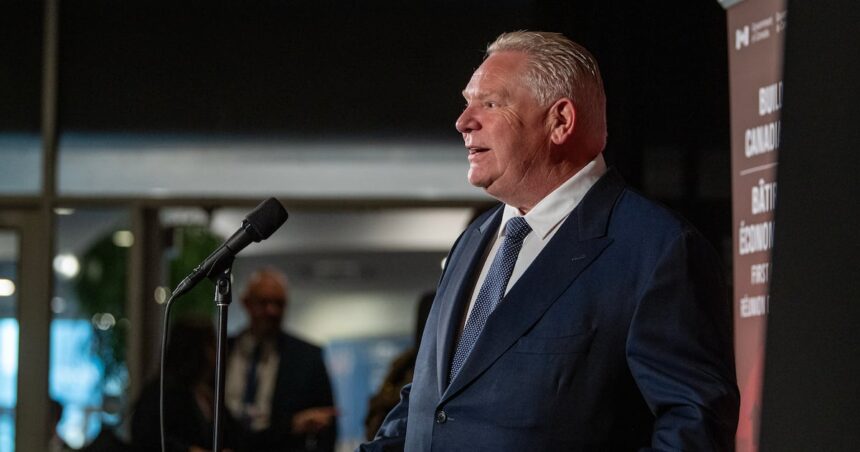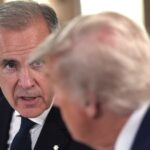The specter of punitive tariffs has once again cast a shadow over Canadian-American trade relations, prompting an unprecedented unified response from Canada’s political leadership. Ontario Premier Doug Ford revealed today that Deputy Prime Minister Mark Carney has agreed to convene an emergency first ministers’ meeting to address Donald Trump’s latest threat of imposing a 25 percent tariff on all Canadian imports if he returns to the White House.
“I spoke to Mark Carney yesterday. We’re going to have a first ministers’ meeting,” Ford told reporters during an unrelated announcement in Vaughan. “We have to be prepared. I’m being pretty frank with everyone. You’ve got to hope for the best and prepare for the worst.”
The urgency of the situation stems from Trump’s recent campaign announcement in Michigan, where he vowed to implement substantial tariffs on Canadian goods immediately upon taking office. This declaration has sent ripples of concern through Canada’s economic landscape, particularly in Ontario where the auto industry forms a crucial pillar of the provincial economy.
Ford emphasized that Canada must present a united front in response to these threats. “Everyone’s nervous right now. We’re going to have everyone around the table,” the premier stated, underscoring the critical need for cross-provincial coordination in what could become Canada’s most significant trade challenge in recent years.
Carney, who recently stepped into his role as Deputy Prime Minister following Chrystia Freeland’s resignation, faces an early and formidable test of his diplomatic acumen. The former Bank of Canada and Bank of England governor’s extensive international economic experience is being viewed as a valuable asset as Canada navigates these turbulent waters.
Economic analysts estimate that Trump’s proposed tariffs could cost the Canadian economy billions of dollars annually and potentially eliminate hundreds of thousands of jobs. The automotive sector, deeply integrated across the Canada-US border, would likely bear the brunt of any new trade barriers.
“This isn’t just about Ontario,” noted trade expert Patricia Goff from Wilfrid Laurier University. “The ripple effects would touch every province and territory, from Alberta’s energy exports to Quebec’s aerospace industry to Atlantic Canada’s natural resources.”
The planned first ministers’ meeting represents a rare moment of federal-provincial alignment in Canadian politics, transcending the often fractious relationships between Ottawa and provincial capitals. Even Alberta Premier Danielle Smith, frequently at odds with the federal government, has signaled support for a coordinated approach.
Trump’s tariff threat comes at a particularly vulnerable moment for the Canadian economy, which has been grappling with inflation, interest rate pressures, and the lingering effects of global supply chain disruptions. Finance Minister Chrystia Freeland has acknowledged the seriousness of the situation, noting that contingency planning has already begun within government departments.
As world markets react to the escalating rhetoric, Canadian business leaders are calling for calm but decisive action. “We’ve weathered trade storms before,” remarked Goldy Hyder, president of the Business Council of Canada. “But preparation is key, and that means government and industry working in lockstep.”
The promised first ministers’ meeting is expected to take place within the coming weeks, though no official date has been announced. As this situation unfolds, the fundamental question remains: Can Canada’s newly aligned political leadership devise an effective strategy to protect its economic interests against potentially devastating tariffs, or will internal divisions ultimately undermine the country’s negotiating position?










